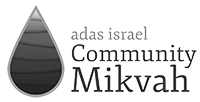by Rabbi Julie Schwarzwald
A month ago, I began the Seven Steps Mikveh Guide Training. Yesterday, I was part of the Beit Din questioning a prospective Jew-by-choice as one of the three clergy. Today, I accompanied this Jew-by-choice as her Mikveh Guide when she immersed and completed the conversion process.
I immersed in a mikveh before my wedding. While none of my friends had done so, it felt important and right to me. I was invited to join a friend during her conversion immersion a decade ago. Before I was ordained, I was asked to serve as a mikveh attendant by the rabbi I worked with for a conversion, without much explanation. Just a few weeks ago, I served on another Beit Din for an immersion for a toddler’s conversion. So, what was different today?
This mikveh is available for all to use, but is run by a collection of Orthodox shuls in the area. I was not the rabbi overseeing the candidate’s conversion study, so I had not been involved in the reserving of the mikveh or communicating to her what was expected. In the five minutes before she arrived, the overseeing rabbi told me what he had explained to her: dunk once, recite both blessings, dunk twice more. I would ensure each was “kasher” (acceptable) and assist with the blessings as needed. To be honest, this was not something I needed any additional training to be able to do.
But I am halfway through Mikveh Guide training, and so I was different today. First, I had the confidence in knowing what the process was, and in understanding my role in it. I could confidently explain where I would be and how I would help. I could ask if she had any questions and have faith that I could answer them. I was prepared to assist – and to hold the robe in a way to preserve her modesty while ensuring each immersion was kosher.
But more than that, I could reflect on the experience as I eagerly completed this week’s assignments as soon as they were available, fortuitously on the topic of immersion for conversion. I reflected on the weeks of learning and conversation with my cohort, on a deeper understanding of all of the reasons one would choose to go to a mikveh, on the sacredness of the space and the transition and transformation occurring within.
Immersion itself is a simple act that takes a very few minutes. From arrival to immersion to naming to locking the door behind us, it was a total of 30 minutes (in this time of pandemic, all preparation is now done at home). Yet this was the culmination of a year of planning and study, and the beginning of a lifetime of living Jewishly. There is something so powerfully intimate in being in the room where it happens, in making eye contact as she rises out of the water to recite the blessings, and then again each subsequent time. And finally, in helping her back into her robe, as a Jew.
As the Israelites stood at Mount Sinai, ready to receive the covenant in Deuteronomy 29:13-14, Moses reminds them of God’s promise: “I make this covenant, with its sanctions, not with you alone, but both with those who are standing here with us this day before God and with those who are not with us here this day.” We understand this to mean that all Jews, past, present and future, born into Judaism and choosing to become Jews later, were at Sinai, accepting the covenant. To be present as that covenant expanded to include one more soul is a truly awe-inspiring moment.
Click here to learn more about Rising Tide’s Online Mikveh Guide training.
 Rabbi Julie Schwarzwald is dedicated to the idea that Jewish education should be fully accessible to all, since we are each created B’tzelem Elohim, in the image of God. Julie currently works as the Director of Congregational Learning at Congregation B’nai Israel in Millburn, NJ, where she is responsible for educational programming for all ages. Julie has a BA from Wesleyan University in Education Policy Studies and an MA from Teachers College, Columbia University in Computing in Education. After years of teaching in public, private, and day schools, Julie received rabbinic ordination in 2019. She is honored to serve on the boards of NewCAJE and the Jewish Educators Assembly, and to be the Associate Director of jMorim.org.
Rabbi Julie Schwarzwald is dedicated to the idea that Jewish education should be fully accessible to all, since we are each created B’tzelem Elohim, in the image of God. Julie currently works as the Director of Congregational Learning at Congregation B’nai Israel in Millburn, NJ, where she is responsible for educational programming for all ages. Julie has a BA from Wesleyan University in Education Policy Studies and an MA from Teachers College, Columbia University in Computing in Education. After years of teaching in public, private, and day schools, Julie received rabbinic ordination in 2019. She is honored to serve on the boards of NewCAJE and the Jewish Educators Assembly, and to be the Associate Director of jMorim.org.



